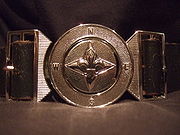
Explorer Belt
Encyclopedia

Scouting
Scouting, also known as the Scout Movement, is a worldwide youth movement with the stated aim of supporting young people in their physical, mental and spiritual development, that they may play constructive roles in society....
organisations which promotes adventure and self-reliance in an international context.
While specific rules on the award vary from one organisation to another, it is generally for older members of the Scout Movement and requires a group of Scout
Scouting
Scouting, also known as the Scout Movement, is a worldwide youth movement with the stated aim of supporting young people in their physical, mental and spiritual development, that they may play constructive roles in society....
s to travel and conduct a set of projects through which they investigate the history, geography, and society of a foreign country.
Germany
Within the Verband Christlicher Pfadfinderinnen und PfadfinderVerband Christlicher Pfadfinderinnen und Pfadfinder
The Verband Christlicher Pfadfinderinnen und Pfadfinder is a German Protestant coed Scouting and Guiding association with about 47,000 members....
the Explorerbelt Expedition is open to members from 17 to 24 years of age.
Prior to the expedition there are two weekend-meetings for planning and preparation. Each group/team consists of two people.
Teams have to prepare a presentation, dealing with a subject in the country visited (cultural, historical, social...).
On the expedition participants travel the foreign country in the teams for 14 days, dealing with their subject. Afterwards there is a camp of one week, together with all participants and instructors.
The belts are awarded in a ceremony during the final meeting, after the expedition, usually a weekend.
Finland
The award is open to members of the senior section of Scouting, and candidates work in pairs.As the pair travel over 200 km during the 10 day expedition, they maintain a diary and conduct between 10 and 18 projects.
The expedition pairs are required to make presentations of their projects and experiences before being awarded the belt.
Ireland
Pairs of Rover Scouts are dropped off at an undisclosed location and are required to find their way back to the basecamp, which a minimum of 200 km away and have the option of completing an extra 100 km by public transport. This distance(200 km minimum) must be walked in 10 days. It is opened to members from 18 to 21 years of age.The teams must complete a minimum of 12 projects and their log books to a certain standard while living on a limited budget. The projects cover sections such as skills and culture, and are aimed at giving the participants an awareness of the countries history, culture and local skills.
The Scouts must also carry all the equipment needed to complete the journey and rucksacks can often weigh anywhere from 12 to 22 kilo's. This includes a tent, cloths, cooking equipment, clothes, first aid equipment, stationary, fuel, water, and whatever food you have bought on your budget, etc.
On reaching the basecamp, the candidates are given a break to recover during which the examiners read through the expedition logbooks and projects. They also make sure the minimum of 200 km has been completed. Rover Scouts deemed to have met the conditions of the award are presented with the Explorer Belt at a ceremony held at the end of the expedition.
In 2008 the Explorer Belt happened in Croatia/Slovenia, the finish point was a town called Bled in NW Slovenia.
In 2007 the Explorer Belt took place in Poland.
In 2009 the Explorer Belt took place in Denmark/Sweden. For what is believed to be the first time, all participants were awarded the Belt. Also, Personal Challenges were introduced.
In 2010 the Explorer Belt took place in the Benelux Region (Belgium, Luxembourg and the Netherlands) . It was the first time that the belt spanned three countries. The teams were dropped off in various locations around Eindhoven in The Netherlands. The finish point was a town called Wiltz in Luxembourg.
In 2011 the Explorer Belt took place in Austria/Czech Republic.
United Kingdom
The award is open to Explorer ScoutsExplorer Scouts
Explorer Scouts , a section of the Scout Association in the United Kingdom for 14- to 18-year-olds, was introduced in 2001 replacing Venture Scouts . This was part of a greater change in programme, including the introduction of Scout Network for 18- to 25-year-olds...
over 16, members of the Scout Network
Scout Network
The Scout Network is the fifth and final section of The Scout Association in the United Kingdom, catering for 18- to 25-year-olds and introduced in 2001, following the review of UK Scouting. It, along with the Explorer Scout section, replaced the Venture Scouts...
(18-25), and members of Girlguiding UK's
Girlguiding UK
Girlguiding UK is the national Guiding organisation of the United Kingdom. Guiding began in the UK in 1910 after Robert Baden-Powell asked his sister Agnes to start a group especially for girls that would be run along similar lines to Scouting for Boys. The Guide Association was a founder member of...
Senior Section aged over 16.
Groups can have up to 4 members, although guidelines state that only older candidates should work in a pair.
In order to achieve the award, the group must spend 10 days in a foreign country and work towards a major project of their choice. They are also asked to complete a further 10 smaller projects - some of their own choice, and some set by the award judges. During this time they must cover 100 miles (~160 km), usually hopping between small villages.
The group must complete all plans and organisation for the expedition, and are also asked to take part in a debrief and then provide a presentation.
They do not need to walk during the expedition (alternatives are horse riding, cycling or canoeing), and may use public transport for up to 15% of the total distance travelled. Since the focus is on learning about the country the candidates are visiting, only an average of a few hours of travelling is required per day.

